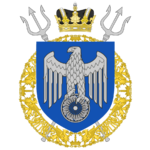Kramākramānē
| Kramākramānē क़दम क़दम बढ़ाये जा Estmerish: Step by Step | |
 Royal Arms | |
National anthem of Rajyaghar | |
| Lyrics | Unknown, Early 20th century |
|---|---|
| Adopted | December 1946 |
"Kramākramānē", (Transl: Step by Step) is the national anthem of the Kingdom of Rajyaghar. It's composer is unknown but it is known to have originated from the southern state of Harringhata and to this day, it is still called by its bhasdilan name rather than its translated version in the national language of matrabashi. However, the lyrics to the song have been changed to a romanticised version of matrabashi.
Written in the early 20th century, Kramākramānē was used as a marching song for the independence movement and it gained national support and usage during the Solarian War when support for independence reached its peak. Following independence in 1946, the first Shahee Sansad passed the National Anthem Act (1946) which legislated for Kramākramānē to be the national anthem of the newly independent Kingdom of Rajyaghar. There was some opposition from monarchists during the debate stage due to its lack of reference to the monarchy. As a result, the wording of the song was changed to incorporate the monarchy and when the legislation came to a vote, it was passed unanimously.
History
The composer of Kramākramānē is still unknown to this day and many historians believe that this was done on purpose by the composer to protect themselves from a possible Etrurian backlash due to the song being composed for the independence movement. It is known to have come from the city of Biratdakot in the state of Harringhata. The anthem quickly spread across the country in what was then Satria Etruriana and provided a significant morale boost to the independence movements in the colony after the fierce and drastic measures put in place following the Chanak rebellion in 1914. In 1915, Kramākramānē was banned by Alessandro Corazza, Governor-General of Satria Etruriana, but it would continue to be sung and played throughout the colony.
During the Solarian War, opposition to Etrurian control reached its peak and the song was routinely sung and played throughout the colony. After the end of the Solarian War, Rajyaghar gained independence and the first Shahee Sansad set about crafting the identity of the newly created nation. Despite Kramākramānē not being the national anthem at the time, on the day of independence in October 1946, Kramākramānē was played as the new Rajyani flag was hoisted on the flagpole of the Royal Palace.
In the Shahee Sansad, there was wide support for Kramākramānē but some monarchists feared that without reference to the monarchy in the national anthem, support for the institution could waver. To alleviate these fears, the Shahee Sansad edited the lyrics of Kramākramānē to incorporate references to the monarchy. In December 1946, the legislature unanimously voted in favour of the National Anthem Act (1946) and the next day Krishan VI signed the legislation into law.
Protocol
The National Anthem Act (1946) outlined several situations in which the national anthem must be played including, but not limited to:
- Civic and military ceremonies and events,
- When raising the national flag,
- Every morning at educational institutions,
- At the beginning of domestic sporting events,
- At the beginning of international sporting events hosted in Rajyaghar,
- At the beginning of national conferences,
In order to avoid disrespecting the national anthem, the Act also laid out what citizens should do when the anthem is played:
- Remain silent,
- Place their right hand over their heart if they are a civilian or military personnel in civilian clothing,
- Salute if they are military personnel in military uniform,
- Stand if possible,
- Face the flag if it is present,
The Monarch of Rajyaghar does not sing the national anthem but does place their hand over their heart or salute it. This is due to several reasons including: the anthem includes several lines referring to service to the monarch and the anthem is about service to the state and the monarch is considered to be the living embodiment of the state.
Lyrics
| Romanticised Matrabashi in latin script | Estmerish translation |
|---|---|
| Qadam qadam baṛhāye jā khushī ke gīt gāye jā taaj aur desh kee seva mein tū qaum pe lutāye jā
|
Keep stepping, stepping forward! keep singing songs of happiness! In service of crown and country, spend it in their servitude!
|
Adaptations
During the Third Satrian War, the lyrics Chalo Kismat were used as a war cry and changed to "Chalo Aja" in reference to Ajahadya. The war cry was used by the government, military and civilians and referred to the national goal of taking the fight directly to Ajahadya in an offensive war rather than being constantly on the defensive. Since the end of the third satrian war, the war cry has rarely been used owing to the cooling of relations and recent rapproachments by successsive rajyani governments since the early 2000s.
